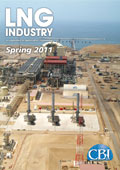Editorial comment
Deputy Chief Executive of Gazprom, Alexander Medvedev has recently stated that the shale gas revolution in the US does not pose any threat to the company, comparing the new and developing shale industry to the internet bubble, reiterating Gazprom’s disinterest in investing in US gas fields and suggesting that the shale bubble will inevitably burst. Gazprom remains confident that it will be called upon to supply 10% of the US gas market by 2020, and asserts it will be sticking to its aim of delivering first LNG shipments from its Shtokman project in 2017. Is Mr Medvedev right not to be intimidated by shale gas? This issue of LNG Industry closely examines ‘the knowns and unknowns’ of the US’s ‘underground revolution’.
Register for free »
Get started now for absolutely FREE, no credit card required.
From shale revolutions to political revolutions; this year is set to be a year of change to say the least. Popular unrest has spread from Tunisia to Egypt, Bahrain, Libya, Iran, Iraq, Yemen and Morocco. Modern globalisation has eased the transfer of information and free expression via the internet, mobile phones, television etc., fostering an opening up of historically ‘closed’ societies – for the large part via the nations’ younger generations.
In this time of uncertainty and rapid change, many are asking how the political revolutions and demonstrations in the Middle East will likely affect the rest of the world. Will the populace of other autocracies such as China look on and follow suit? Despite recent internet-led calls for a day of demonstrations put forward as the ‘Jasmine Revolution’ (which came to nothing) the consensus answer seems to be no; the government of a generally optimistic China, proud of its growing international standing, has less to worry about than Obama’s Administration. The US has lost a staunch Arabic ally in Egypt. Further strong alliances remain with Israel and Saudi Arabia, but how will Mr Mubarak’s departure affect these hitherto secure alliances? It remains to be seen, but insofar as energy security is concerned, Israel is taking more rapid steps to diversify its domestic energy supply and wean itself off an Egyptian dependency.
As well as being a gateway to business in the Middle East with close links to Saudi Arabia, Bahrain is headquarters to the US Fifth Fleet – the platform for American deployment in the Gulf. With increasingly bloody violence escalating in Bahrain between rulers and reformists, how and to what extent will the US support, condemn or try to influence the ongoing protests and revolutions in this part of the world? Whereas the western instinct would be to cheer on the people demanding democracy and ‘freedom’, the likelihood is that some choices made by the people exercising their newfound voices in the future will not be especially agreeable to the Obama Administration. On 18 February The Financial Times’ Philip Stephens noted “The ancient regime rested on bargains with leaders. In future, Washington’s ability to make itself heard will depend on what it says to civil society in the region.” It’s clear that the uprisings in the Middle East will pose complex challenges to US interests. Whether Deputy Chief Executive of Gazprom threatened by a huge change in the US, or US President apprehensive over change in the Middle East, it seems both Mr Medvedev and Mr Obama have a good few knowns and unknowns of their own to deal with.

